ERLA’S DIRECTORY – Section 1.1
SPACE WHERE ERLA MEMBERS CAN SHARE KEY RELEVANT FACTS, IDEAS, CONCEPTS AND FINDINGS
VERBAL HIGHLIGHTS
|
FACTS |
||
| ERLA on the list of Linguistics Association of Great Britain | http://clie.org.uk/links/ ERLA opening the list of international organisations recognised by Committee for Linguistics in Education as crossing bridges between linguistics and schools | 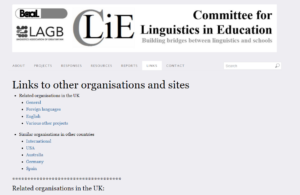 |
| 4th ERL Conference (17-19 June 2019) | Educational Role of Language. From Theory to Practice, from Practice to Theory, University of Craiova, Romania |  |
| Publication of ERL Journal Volume 2019-1(1) | Boosting the Educational Experiencing of Language. Sections: Experiencing language content, Experiencing digital interaction, Experiencing the spoken word, Experiencing the written word | 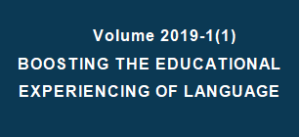 |
| Publication of ERL Journal Volume 2019-2(2) | Enhacing Multiculturalism in EFL Communication. Sections: Multiculturalism in didactic practices, Multiculturalism in educational documents, Multicultural beliefs, Multicultural experience | 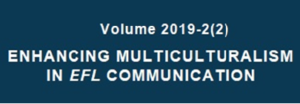 |
| IDEAS | ||
| Our joint analysis of the reciprocity between learning and four language skills | 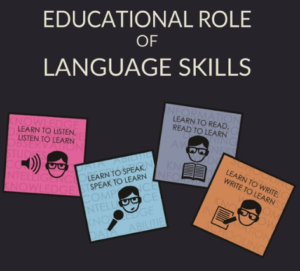 |
Prompted by the subtitle of the first ERL Conference – Learn to Speak, Speak to Learn, the three co-authors (M. Daszkiewicz (ERLA’s founder and member), M. Kusiak-Pisowacka (ERLA’s members), R. Wenzel (ERLA’s supporter)) studied the link between the four fundamental language skills and learning, working both ways (Contents). The analysis is preceded by a chapter on education (as a whole) through the prism of language skills and another one on genuine vs. artificial language interaction in the classroom. Additionally, it is followed by a section outliniing the relevant scope through sets of research problems falling within ERL’s four areas (later referred to as the strands of Scope Minor) |
| The need for communication between linguistic sub-disciplines | 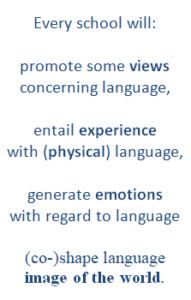 |
As language cuts across educational domains, that is beliefs, activity, affect, and thinking, there is a need – fulfilled under the ERL Framework – for specialists of multiple linguistic subdisciplies communicating and cooperating wuth one another. |
VISUAL HIGHLIGHTS
|
CONCEPTS |
||
| Educational Role of Language |  |
ERLA’s key notion can be understood differently,, ERLA Members present their interpretations of the educational role of language in the second section of their personal ERLA pages |
|
FINDINGS |
||
| Subservient role of speech in non-linguistic education as presented by university students | 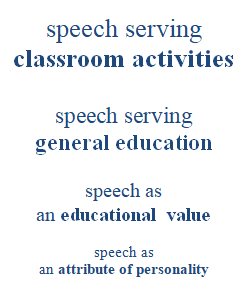 |
When it comes to non-linguistic education, universty students tend to assign speech a clearly secondary (if not tertiary) function, seeing it as a means rather than an (additional) educational aim or a personal attribute worth developing for its own sake. Regardless of wherher their reasons are retated to beliefs (eg. “I speak to express my views), activty (e.g. I speak to have more practice), affect, (e.g. I soeak to share my emotions with my peers), or reasoing (e.g. I speak to understand the subject matter better), their decisions to speak or not to speak show the degree in which language proves to be taken into granted (with a highly detrimental effect). To read more about the study, go to To speak or not to speak. |